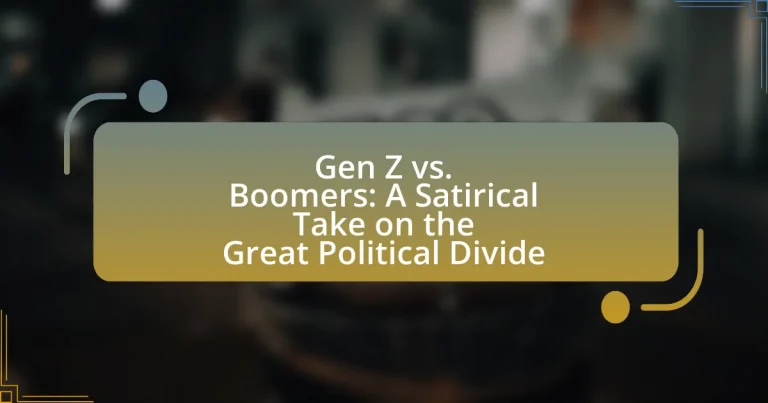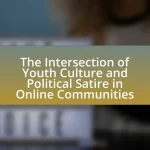The article “Gen Z vs. Boomers: A Satirical Take on the Great Political Divide” examines the stark differences in political views between Generation Z and Baby Boomers, focusing on their attitudes toward social issues, government involvement, and climate change. It highlights how generational experiences shape political beliefs, with Boomers influenced by historical events like the Civil Rights Movement and Gen Z shaped by digital media and social justice movements. The article also explores the impact of technology on political engagement, communication styles, and the role of humor and satire in bridging the generational divide, while addressing common stereotypes and misconceptions held by both groups. Strategies for fostering intergenerational dialogue and finding common ground on key issues are also discussed, emphasizing the importance of empathy in understanding differing political perspectives.
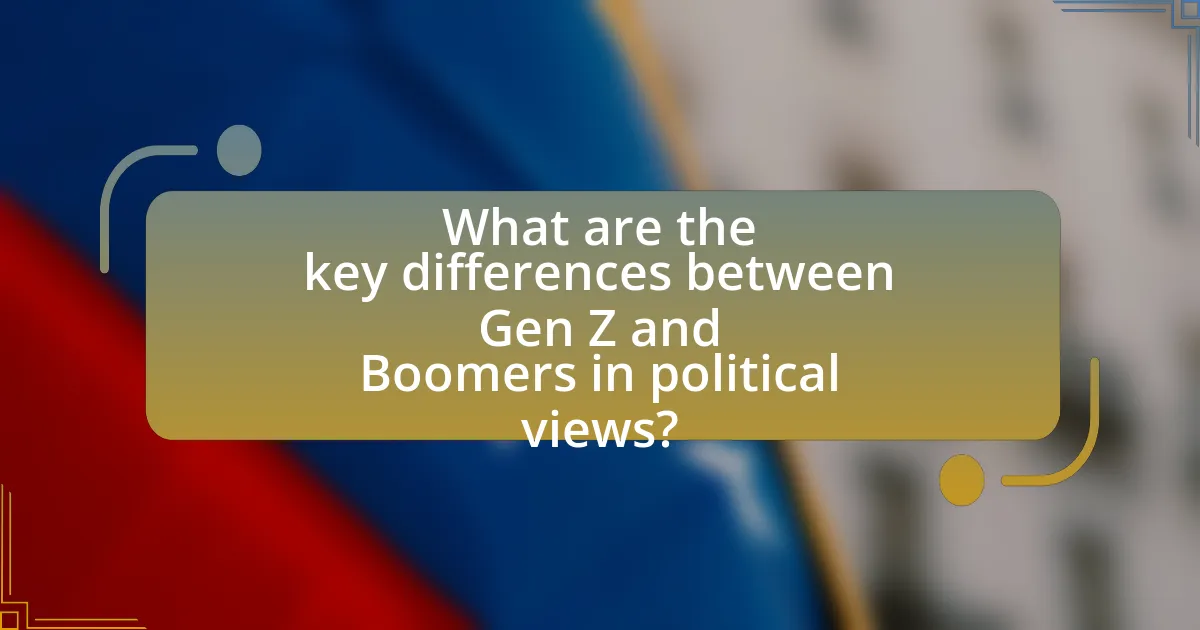
What are the key differences between Gen Z and Boomers in political views?
Gen Z and Boomers differ significantly in their political views, primarily in their attitudes toward social issues, government involvement, and climate change. Gen Z tends to prioritize social justice, inclusivity, and environmental sustainability, advocating for policies that address systemic inequalities and climate action. In contrast, Boomers often emphasize traditional values, fiscal conservatism, and a preference for limited government intervention in personal and economic matters. For instance, a 2021 Pew Research study found that 70% of Gen Z supports government action on climate change, while only 45% of Boomers share that view, highlighting a generational divide in prioritizing environmental issues.
How do generational experiences shape political beliefs?
Generational experiences significantly shape political beliefs by influencing individuals’ perspectives based on the historical and social contexts they encounter during formative years. For instance, Baby Boomers, who grew up during the post-World War II economic expansion, often prioritize stability and traditional values, reflecting their experiences of prosperity and social change. In contrast, Generation Z, raised amid economic uncertainty, climate change, and social justice movements, tends to advocate for progressive policies and inclusivity, mirroring their exposure to diverse viewpoints and global challenges. Research indicates that these differing experiences lead to distinct political ideologies, with Boomers favoring conservative policies and Gen Z leaning towards liberal stances, as evidenced by surveys showing that 70% of Gen Z supports climate action compared to 50% of Boomers.
What historical events influenced Boomers’ political perspectives?
The political perspectives of Baby Boomers were significantly influenced by key historical events such as the Civil Rights Movement, the Vietnam War, and Watergate. The Civil Rights Movement of the 1960s, which aimed to end racial segregation and discrimination, shaped Boomers’ views on social justice and equality. The Vietnam War, marked by widespread protests and a growing anti-war sentiment, led many Boomers to question government authority and foreign policy. Additionally, the Watergate scandal in the early 1970s fostered a sense of distrust in political institutions, further impacting their political ideologies. These events collectively contributed to a generation that values civil rights, skepticism of government, and a desire for social change.
What societal changes have shaped Gen Z’s political outlook?
Gen Z’s political outlook has been shaped significantly by societal changes such as increased access to information through digital media, heightened awareness of social justice issues, and the impact of climate change. The rise of social media platforms has enabled Gen Z to engage with diverse perspectives and mobilize around causes like racial equality and LGBTQ+ rights, leading to a more progressive political stance. Additionally, the urgency of climate change has fostered a collective consciousness about environmental sustainability, influencing their support for policies aimed at combating global warming. According to a 2021 Pew Research Center study, 70% of Gen Z respondents believe that climate change is a major threat, reflecting their prioritization of environmental issues in political discourse.
What role does technology play in the political engagement of each generation?
Technology significantly influences the political engagement of each generation by shaping how they access information, communicate, and mobilize. For example, Gen Z predominantly utilizes social media platforms like TikTok and Instagram to engage with political issues, often leading to viral movements and increased activism, as evidenced by the 2020 Black Lives Matter protests that gained momentum through these channels. In contrast, Baby Boomers tend to rely on traditional media sources such as television and newspapers, which can limit their exposure to diverse viewpoints and grassroots movements. This generational divide in technology use highlights the varying methods of political participation, with younger individuals favoring digital activism and older generations often engaging through established political institutions.
How does social media impact Gen Z’s political activism?
Social media significantly enhances Gen Z’s political activism by providing a platform for rapid information dissemination and mobilization. This generation utilizes platforms like Instagram, TikTok, and Twitter to raise awareness about social issues, organize protests, and engage in discussions, often leading to viral movements. For instance, the Black Lives Matter movement gained substantial traction through social media, with Gen Z playing a crucial role in its promotion and organization, as evidenced by the over 26 million posts tagged with #BlackLivesMatter on Instagram alone. This digital engagement allows Gen Z to connect with like-minded individuals globally, amplifying their voices and fostering a sense of community around political causes.
What traditional media influences Boomers’ political opinions?
Television significantly influences Boomers’ political opinions, as it has been a primary source of news and information for this generation. Research indicates that Boomers often rely on major networks like CNN, NBC, and CBS for political coverage, shaping their views through the framing and narratives presented. According to a Pew Research Center study, 61% of Boomers prefer television as their main source of news, highlighting its critical role in informing their political perspectives.
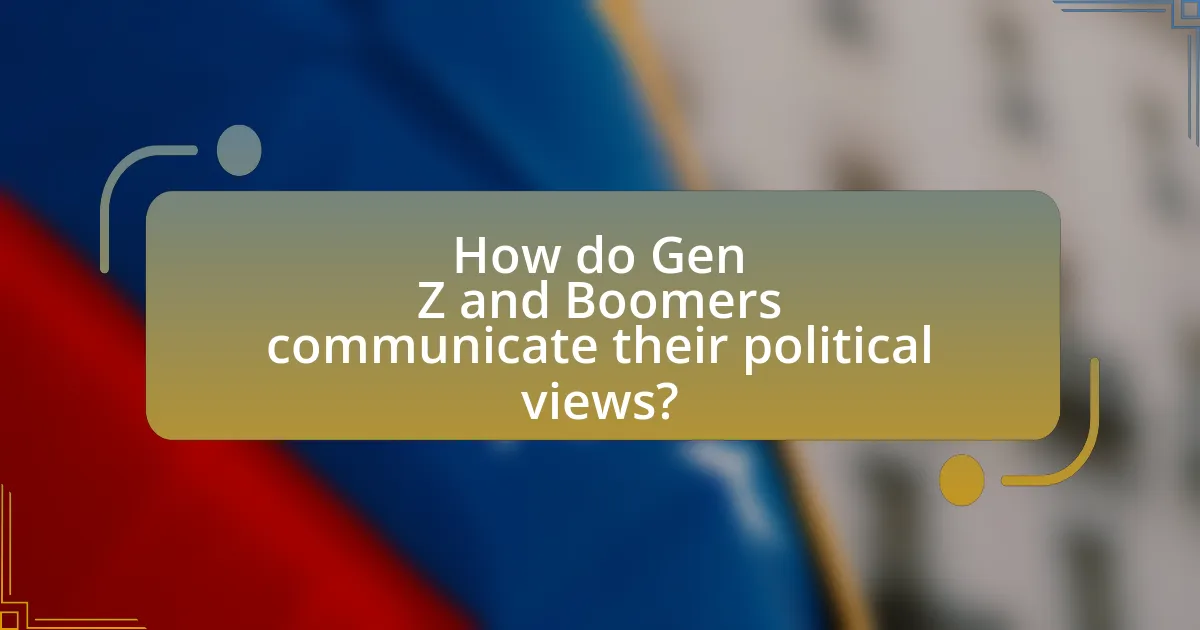
How do Gen Z and Boomers communicate their political views?
Gen Z communicates their political views primarily through social media platforms, while Boomers tend to use traditional media such as television and print. Research indicates that 70% of Gen Z engages in political discussions on platforms like TikTok and Instagram, utilizing memes and short videos to express their opinions. In contrast, Boomers often rely on news broadcasts and newspapers, with 60% of them stating that they prefer these sources for political information. This generational divide highlights differing communication styles, with Gen Z favoring rapid, visual content and Boomers opting for more in-depth, text-based analysis.
What platforms do each generation prefer for political discourse?
Gen Z prefers social media platforms like TikTok and Instagram for political discourse, while Boomers favor traditional media such as television and Facebook. Research indicates that 60% of Gen Z engages in political discussions on TikTok, leveraging its short-form video format to express opinions, whereas 70% of Boomers rely on television news and Facebook for political information, reflecting their comfort with established media channels. This generational divide highlights differing communication styles and platform preferences in political engagement.
How does the choice of platform affect the message conveyed?
The choice of platform significantly affects the message conveyed by determining the audience’s perception and engagement level. Different platforms, such as social media, traditional media, or face-to-face interactions, cater to distinct demographics and communication styles. For instance, Gen Z predominantly uses platforms like TikTok and Instagram, which favor visual content and brevity, leading to messages that are often more informal and humorous. In contrast, Boomers may prefer platforms like Facebook or traditional news outlets, where messages are typically more formal and detailed. This divergence in platform choice influences not only the tone and style of the message but also its reach and effectiveness, as evidenced by studies showing that younger audiences engage more with visual storytelling, while older audiences respond better to in-depth articles and discussions.
What are the implications of differing communication styles on political debates?
Differing communication styles significantly impact political debates by influencing the effectiveness of message delivery and audience engagement. For instance, Gen Z tends to favor direct, concise, and visually engaging communication, often utilizing social media platforms, while Boomers may prefer more traditional, formal discourse that emphasizes detailed explanations and face-to-face interactions. This divergence can lead to misunderstandings, as Gen Z’s rapid-fire style may be perceived as superficial by Boomers, while Boomers’ lengthy arguments may be viewed as outdated or irrelevant by Gen Z. Research indicates that these contrasting styles can affect voter mobilization and participation rates, with younger voters being more likely to engage with candidates who adopt their preferred communication methods.
How do humor and satire play a role in political discussions between generations?
Humor and satire serve as critical tools in bridging political discussions between generations, particularly between Gen Z and Boomers. These forms of expression allow younger individuals to critique and challenge established norms and viewpoints held by older generations in a manner that is more palatable and engaging. For instance, satirical content on social media platforms often highlights the absurdities of political stances, making complex issues more relatable and sparking dialogue. Research indicates that humor can reduce defensiveness in discussions, facilitating open communication and understanding, as seen in studies by the Pew Research Center, which show that humor can foster connection across generational divides. Thus, humor and satire not only entertain but also promote critical thinking and dialogue in political discourse between different age groups.
What are some examples of satirical content that resonate with Gen Z?
Examples of satirical content that resonate with Gen Z include social media memes, TikTok videos, and web series that humorously critique societal norms and political issues. For instance, TikTok creators often use satire to address topics like climate change and economic inequality, reflecting Gen Z’s concerns. Additionally, shows like “The Onion” and “Saturday Night Live” produce sketches that parody generational differences, particularly between Gen Z and Boomers, highlighting the absurdities of their interactions. These forms of satire effectively engage Gen Z by combining humor with relevant social commentary, making complex issues more accessible and relatable.
How do Boomers respond to satire in political contexts?
Boomers often respond to satire in political contexts with skepticism and a tendency to take it literally. This generational cohort, having grown up in a different media landscape, may struggle to recognize the nuances of satire, leading to misunderstandings of the intended humor. Research indicates that older adults, including Boomers, are less likely to engage with satirical content due to cognitive biases and a preference for straightforward communication. For instance, a study published in the journal “Media Psychology” found that older audiences often interpret satirical messages as factual, which can result in confusion and misinterpretation of political commentary.
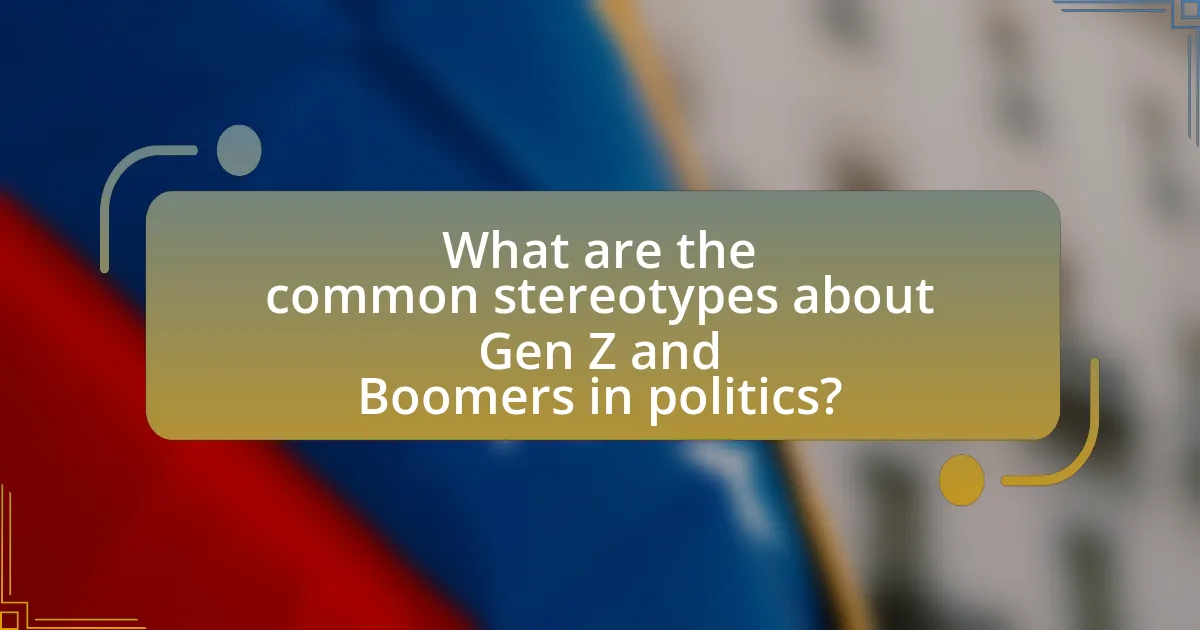
What are the common stereotypes about Gen Z and Boomers in politics?
Common stereotypes about Gen Z in politics include the belief that they are overly progressive, tech-savvy, and disengaged from traditional political processes. In contrast, Boomers are often stereotyped as conservative, resistant to change, and reliant on outdated media sources. These stereotypes reflect generational differences in values and communication styles, with Gen Z prioritizing social justice and environmental issues, while Boomers tend to focus on economic stability and traditional values. Research indicates that Gen Z is more likely to support policies like universal healthcare and climate action, whereas Boomers often emphasize fiscal responsibility and personal accountability.
How do these stereotypes affect intergenerational dialogue?
Stereotypes significantly hinder intergenerational dialogue by creating preconceived notions that lead to misunderstandings. For instance, the stereotype that Boomers are resistant to change can cause Gen Z to dismiss their perspectives without consideration, while the stereotype that Gen Z is overly sensitive may lead Boomers to undervalue their concerns. Research indicates that these stereotypes can result in communication barriers, as individuals may approach conversations with bias rather than openness, ultimately stifling productive discussions. This dynamic is evident in various studies, such as those conducted by the Pew Research Center, which highlight the impact of generational stereotypes on perceptions and interactions.
What misconceptions do Boomers have about Gen Z’s political engagement?
Boomers often misconceive Gen Z’s political engagement as apathetic or disengaged. This belief stems from a lack of understanding of Gen Z’s unique forms of activism, which frequently occur online and through social media platforms. Research indicates that 76% of Gen Z members believe that social media is an effective tool for political engagement, demonstrating their active participation in political discourse, albeit in non-traditional ways. Furthermore, Gen Z has been instrumental in movements such as climate activism and social justice, showcasing their commitment to political issues. These misconceptions overlook the fact that Gen Z is not only politically aware but also utilizes modern communication methods to advocate for change.
What myths do Gen Z hold about Boomers’ political motivations?
Gen Z holds several myths about Boomers’ political motivations, primarily believing that Boomers prioritize personal financial gain over societal welfare. This perception stems from the observation that many Boomers have benefited from policies that favor wealth accumulation, such as tax cuts and real estate investments. Additionally, Gen Z often views Boomers as resistant to progressive changes, assuming they oppose issues like climate action and social justice due to a perceived self-interest in maintaining the status quo. These beliefs are reinforced by generational stereotypes and media portrayals that emphasize conflict rather than collaboration between the age groups.
What strategies can bridge the political divide between Gen Z and Boomers?
To bridge the political divide between Gen Z and Boomers, fostering intergenerational dialogue is essential. This can be achieved through structured community forums that encourage open discussions on political beliefs, allowing both generations to share perspectives and find common ground. Research indicates that face-to-face interactions can reduce biases and promote understanding, as seen in studies by the Pew Research Center, which highlight the importance of communication in bridging generational gaps. Additionally, collaborative projects focused on shared interests, such as climate action or social justice, can unite both groups around common goals, further enhancing mutual respect and cooperation.
How can both generations find common ground on key issues?
Both generations can find common ground on key issues by engaging in open dialogue and focusing on shared values such as community, sustainability, and social justice. Research indicates that both Gen Z and Boomers prioritize environmental concerns, with 75% of Gen Z considering climate change a significant issue, while many Boomers also express concern for future generations. By collaborating on initiatives that address these shared priorities, both groups can bridge their differences and work towards common goals.
What role does empathy play in understanding differing political views?
Empathy plays a crucial role in understanding differing political views by fostering open dialogue and reducing polarization. When individuals practice empathy, they are more likely to consider the perspectives and experiences of others, which can lead to a deeper comprehension of the motivations behind opposing beliefs. Research indicates that empathetic engagement can decrease hostility and promote constructive conversations, as seen in studies where participants who engaged in empathetic listening reported a greater willingness to understand and accept differing viewpoints. This understanding is essential in bridging the generational divide between groups like Gen Z and Boomers, as it encourages collaboration and mutual respect despite differing political ideologies.
What practical tips can help foster productive political conversations across generations?
To foster productive political conversations across generations, individuals should prioritize active listening and empathy. Active listening involves fully concentrating on what the other person is saying, which can help bridge the generational gap by ensuring that each party feels heard and respected. Empathy allows individuals to understand differing perspectives, which is crucial in discussions that often involve deeply held beliefs. Research indicates that when people engage in empathetic dialogue, they are more likely to find common ground and reduce conflict (Cohen, 2016, “The Role of Empathy in Political Discourse,” Journal of Political Communication). Additionally, using neutral language and avoiding inflammatory terms can create a more conducive environment for discussion, as it minimizes defensiveness and promotes open exchange of ideas.
